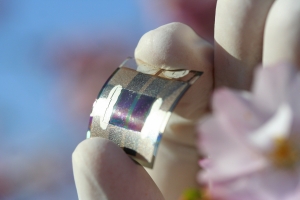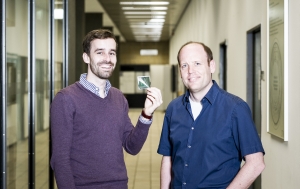The 2015 Gips-Schüle Research Award in the amount of EUR 50,000 goes to the research project “Nanoparticles for the Environmentally Compatible Production of Organic Solar Cells” of Karlsruhe Institute of Technology (KIT) in cooperation with MJR PharmJet GmbH. The project in which engineers, physicists, chemists, and biologists cooperate is aimed at developing low-cost methods for the production of new solar cells without any solvents that are harmful to human health.
“Photovoltaics is a major component of electricity supply based on renewable sources. Current growth rates suggest that its relevance will significantly increase in the future. Hence, it is very important to use “green” technologies for production already,” the President of KIT, Professor Holger Hanselka, says. “The novel process developed by KIT in cooperation with industry is not only highly innovative, but also sustainable and inexpensive. The Gips-Schüle Research Award is a wonderful recognition of this great achievement.”
They are light, flexible, and can be produced in many colors: Organic solar cells have many advantages over conventional cells and can be used in a variety of applications and designs. So far, manufacture of these solar cells or, to be more exact, precipitation of layers made of light-absorbing organic semiconductors has required the use of solvents harmful to health.

Light, flexible, and environmentally compatible: The novel solar cells have many advantages over conventional organic solar cells. (Photo: Felix Nickl)
Within the framework of the UNICORN project funded by the Federal Ministry of Education and Research (BMBF), KIT researchers, in cooperation with MJR PharmJet GmbH, have developed environmentally compatible processes for the coating and printing of organic semiconductors. “In our process, we disperse semiconductors in the form of nanoparticles in halogen-free solvents, such as alcohols,” Dr. Alexander Colsmann, Head of the Organic Photovoltaics Group of KIT’s Light Technology Institute, explains. “This environmentally friendly production process reduces costs, as the partly highly complex safety measures are no longer required.” The novel nanoparticle-based solar cells reach about the same efficiencies as conventional organic solar cells.
“The jury members were convinced by the environmental compatibility of the production process and the smaller CO2 footprint as well as by the fact that the results have already been published in high-ranking journals and at conferences. In the opinion of the jury, the process proposed will revolutionize the production of organic solar cells,” spokesman of the jury and Member of the Supervisory Board of the Gips-Schüle Foundation, Professor Peter Frankenberg, says.
The Foundation grants the Gips-Schüle Research Award to interdisciplinary research projects of high innovation potential and of special and sustainable benefit for the society. On the occasion of the 50th anniversary of the foundation, the award that is now granted for the second time is endowed with an amount of EUR 50,000. Dr. Alexander Colsmann, Head of the Organic Photovoltaics Group of KIT, Stefan Gärtner (M.Sc.), scientific employee of KIT, and Dr. Bernd Baumstümmler, Managing Director of MJR PharmJet GmbH received the award at today’s anniversary celebration in Stuttgart. The Special Research Award in the amount of EUR 15,000 for social innovations goes to a project of the hospital Klinikum rechts der Isar of TU Munich, which uses music for therapy.
Being “The University in the Helmholtz Association”, KIT creates and imparts knowledge for the society and the environment. It is the objective to make significant contributions to the global challenges in the fields of energy, mobility, and information. For this, about 10,000 employees cooperate in a broad range of disciplines in natural sciences, engineering sciences, economics, and the humanities and social sciences. KIT prepares its 22,800 students for responsible tasks in society, industry, and science by offering research-based study programs. Innovation efforts at KIT build a bridge between important scientific findings and their application for the benefit of society, economic prosperity, and the preservation of our natural basis of life. KIT is one of the German universities of excellence.

